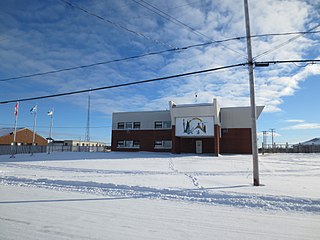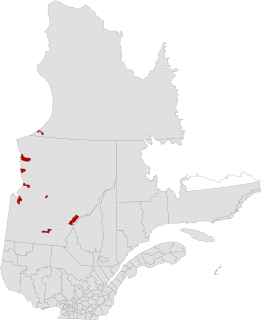The Parti Québécois is a sovereignist and social democratic provincial political party in Quebec, Canada. The PQ advocates national sovereignty for Quebec involving independence of the province of Quebec from Canada and establishing a sovereign state. The PQ has also promoted the possibility of maintaining a loose political and economic sovereignty-association between Quebec and Canada. The party traditionally has support from the labour movement, but unlike most other social democratic parties, its ties with organized labour are informal. Members and supporters of the PQ are nicknamed péquistes, a French word derived from the pronunciation of the party's initials in Quebec French.

Bernard Landry was a Canadian politician who served as the 28th premier of Quebec from 2001 to 2003. A member of the Parti Québécois (PQ), he led the party from 2001 to 2005, also serving as the leader of the Opposition from 2003 to 2005.

The Quebec sovereignty movement is a political movement whose objective is to achieve the sovereignty of Quebec, a province of Canada since 1867, including in all matters related to any provision of Quebec's public order that is applicable on its territory. Sovereignists suggest that the people of Quebec make use of their right to self-determination – a principle that includes the possibility of choosing between integration with a third state, political association with another state or independence – so that Quebecois, collectively and by democratic means, give themselves a sovereign state with its own independent constitution.
The politics of Quebec are centred on a provincial government resembling that of the other Canadian provinces, namely a constitutional monarchy and parliamentary democracy. The capital of Quebec is Quebec City, where the Lieutenant Governor, Premier, the legislature, and cabinet reside.

The 2003 Quebec general election was held on April 14, 2003, to elect members of the National Assembly of Quebec (Canada). The Parti libéral du Québec (PLQ), led by Jean Charest, defeated the incumbent Parti Québécois, led by Premier Bernard Landry.

The James Bay Project refers to the construction of a series of hydroelectric power stations on the La Grande River in northwestern Quebec, Canada by state-owned utility Hydro-Québec, and the diversion of neighbouring rivers into the La Grande watershed. It is located between James Bay to the west and Labrador to the east, and its waters flow from the Laurentian Plateau of the Canadian Shield. The project covers an area the size of New York State and is one of the largest hydroelectric systems in the world. It has cost upwards of US$20 billion to build and has an installed generating capacity of 16,527 megawatts. If fully expanded to include all of the original planned dams, as well as the additional James Bay II projects, the system would generate a total of 27,000 MW, making it the largest hydroelectric system in the world. It has been built since 1974 by James Bay Energy (SDBJ) for Hydro-Québec.

The Rupert River is one of the largest rivers in Quebec, Canada. From its headwaters in Lake Mistassini, the largest natural lake in Quebec, it flows 556 kilometres (345 mi) west into Rupert Bay on James Bay. The Rupert drains an area of 43,400 square kilometres (16,800 sq mi).

The Parti Québécois leadership election of 2005 was held from November 13 to November 15, 2005 to elect the new leader of the Parti Québécois, the main sovereigntist and social democratic political party in Quebec, Canada.
The James Bay and Northern Quebec Agreement is an Aboriginal land claim settlement, approved in 1975 by the Cree and Inuit of northern Quebec, and later slightly modified in 1978 by the Northeastern Quebec Agreement, through which Quebec's Naskapi First Nation joined the agreement. The agreement covers economic development and property issues in northern Quebec, as well as establishing a number of cultural, social and governmental institutions for Indigenous people who are members of the communities involved in the agreement.

Eastmain is a Cree community located on east coast of James Bay at the mouth of the Eastmain River, Quebec, Canada. It is a small coastal Cree village with a population of 924 people in the 2021 Canadian Census up from 866 people at the 2016 Canadian Census. Its alternate Cree name is ᐙᐸᓅᑖᐤ/Wâpanûtâw, meaning Lands east of James Bay.

The 2007 Quebec general election was held in the Canadian province of Quebec on March 26, 2007 to elect members of the 38th National Assembly of Quebec. The Quebec Liberal Party led by Premier Jean Charest managed to win a plurality of seats, but were reduced to a minority government, Quebec's first in 129 years, since the 1878 general election. The Action démocratique du Québec, in a major breakthrough, became the official opposition. The Parti Québécois was relegated to third-party status for the first time since the 1973 election. The Liberals won their lowest share of the popular vote since Confederation, and the PQ with their 28.35% of the votes cast won their lowest share since 1973 and their second lowest ever. Each of the three major parties won nearly one-third of the popular vote, the closest three-way split in Quebec electoral history until the 2012 election. This was however, the closest three-way race in terms of seat count. Voter turnout among those eligible was 71.23%, a marginal difference from the previous general election in 2003.
Nicolas Girard is a politician in Quebec, Canada, and former member of the National Assembly of Quebec. He was elected to the National Assembly in a by-election as a Parti Québécois member on September 20, 2004 in riding of Gouin in the Montreal region.

Joseph Facal is a Canadian politician, academic, and journalist in the province of Quebec. He was a Parti Québécois member of the National Assembly of Quebec from 1994 to 2003 and was a cabinet minister in the governments of Lucien Bouchard and Bernard Landry.
The Agreement Respecting a New Relationship Between the Cree Nation and the Government of Quebec is an agreement between the Government of Quebec, Canada, and the Grand Council of the Crees. It was signed on February 7, 2002 in Waskaganish, Jamésie, Quebec, after decades of court battles between the Cree and the Government of Quebec. The name was inspired by the 1701 Great Peace of Montreal, also known as "La Paix des Braves".
Luc Ferland is a Canadian politician, who was a Parti Québécois member of the National Assembly of Quebec for the riding of Ungava from 2007 to 2014.
Michel Létourneau was a Canadian politician in the province of Quebec. He served in the National Assembly of Quebec from 1994 to 2007 as a member of the Parti Québécois (PQ) and was a cabinet minister in the government of Bernard Landry.

The Grand Council of the Crees or the GCC(EI), is the political body that represents the approximately 18,000 Cree people of the territory called Eeyou Istchee in the James Bay and Nunavik regions of Northern Quebec, in The Grand Council has twenty members: a Grand Chief and Deputy-Grand Chief elected at large by the Cree people, the Chiefs elected by each of the ten communities, and one other representative from each community.
Pierre Bélanger is a Canadian lawyer and politician in the province of Quebec. Bélanger was a Parti Québécois (PQ) member of the National Assembly of Quebec from 1992 to 1998 and was a cabinet minister in the government of Lucien Bouchard.
The 2016 Parti Québécois leadership election occurred from October 5 to October 7, 2016 due to the resignation of Parti Québécois leader Pierre Karl Péladeau on May 2, 2016. Jean-François Lisée was elected on the second ballot with 50.63% of the vote.
Abel Bosum is a Cree leader and negotiator who, as of 2019, is serving as Grand Chief of the Grand Council of the Crees of Northern Quebec and President of the Eeyou Istchee James Bay Regional Government. He has worked for the Grand Council of the Crees of Quebec since 1977 in various capacities. From 1984 to 1998, Bosum served as the Chief of his home nation, the Oujé-Bougoumou Cree Nation. During his time as chief, he was able to negotiate a multimillion-dollar deal with the governments of Quebec and Canada to build a new village for the nation following the peoples' seventh forcible relocation due to mining and forestry activity in Northern Quebec. In 1998, he became the head negotiator of the Grand Council of the Crees of Quebec. Since 2015, Abel Bosum has also served as President of the Aanischaaukamikw Foundation and of the Aanischaaukamikw Cree Cultural institute.










